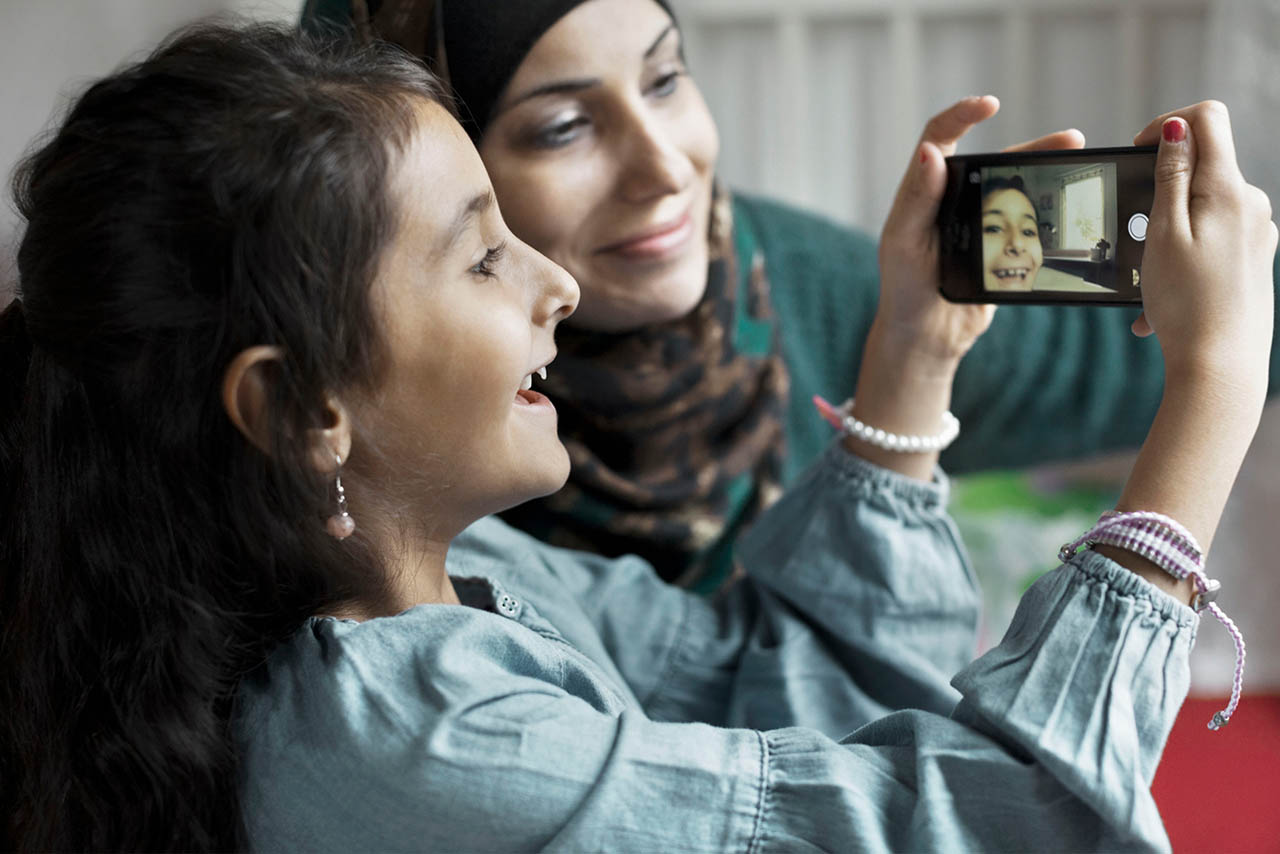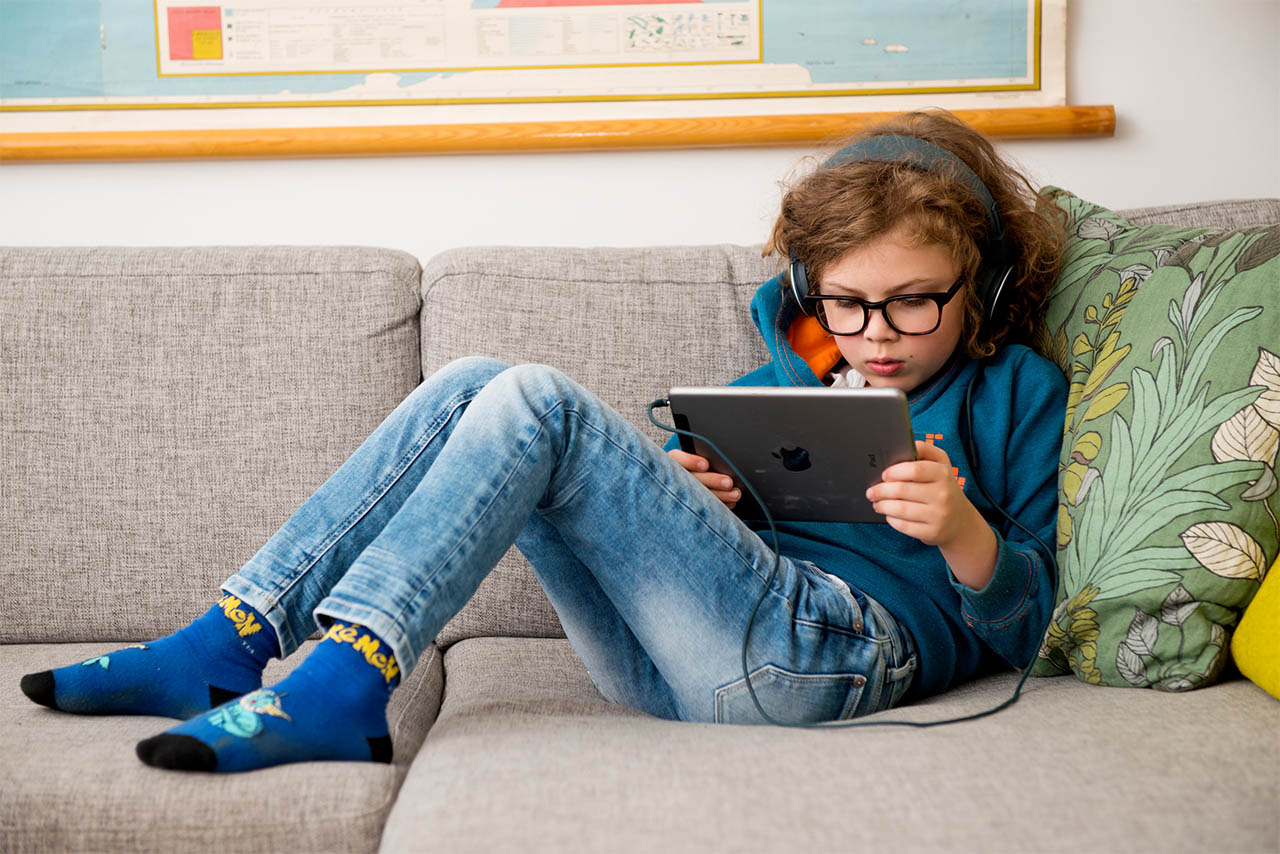
Lighting First Aid for the TikTok-generation
When lighting expert Shelley James realized how lockdown affects the wellbeing of kids and teenagers, she was shocked. Now she is joining forces with Fagerhult to improve the light health of the TikTok-generation.
Nieces halo and amity are two of the most important people in Dr Shelley James’ life.
”They’re such an inspiration to me”, she laughs.
With a PhD from the Royal College of Art and as an international expert on light and well-being (you might have seen her appearing on the award-winning BBC series ”Innovations that Changed the World” and on the webinar series the Neuroscience of Light) Shelley James has in-depth knowledge of how light affects our well-being through life. With her cheerful nieces around she has developed a deep commitment to improve the light health of teenagers.
”The adolescent brain is going through the most amazing process and it cannot be compared to the brain of a grown up. The connections between different parts of the brain are going through profound change, which is key to their health and happiness into adulthood and beyond. This, along with the rapid changes in their physical bodies, means that they need an hour more sleep than a ten year old”, Shelley James explains.
”In fact, the teenager’s circadian rhythm is running two hours late compared to an adult. That means that a 7am wake-up call for an adult feels like 5am for an adolescent. Might be good to know if you have teenagers around…”
ALARMING SITUATION
This said, the access to daylight and high-quality artificial light at the right time of day – with the right colour and in the right amount – is crucial for the health of teenagers always. In times of lockdown Shelley James finds the situation alarming. Homeschooling has resulted in wrecked routines and young people spending their days in their rooms with drawn blinds in front of a computer screen. Many of them do not go outside for long periods, meaning they are not getting any daylight at all.
”When lockdown came, I saw how young people around me were living in dark rooms and working in weak flickering light on the kitchen table. I was shocked by how little they knew about how their bodies and minds were affected by this.”
The common denominator between the rise in myopia, obesity, depression and learning difficulties among young people is the lack of good lighting, concludes Shelley James.
”We are already seeing problems with kids not getting enough sleep. When your body clock is not working properly it leads to struggles with obesity, mental health and concentration problems.”
SIMPLE SOLUTIONS
The good news is, that this can all be easily prevented, if only the teenagers themselves (and okay, their parents and teachers as well) had some basic lighting knowledge. It’s really simple, she says.
”Did you, for example, know that you don’t have to wear glasses just because your parents did? If you spend time outdoors, getting enough daylight when growing up, you can reduce the risk of ending up wearing glasses by up to 40 percent.”
Another fun fact that teenagers would benefit from knowing is that you can actually boost your brain with 20 percent higher learning capacity – just by switching of lights and screens and go to bed at the proper hour.
”In 2021, lighting is quite different than in it used to be. I think it’s a wonderful thing that development in the electronics has reduced a lot of the flicker – and tunable light is opening the door to different light colours to improve our well-being”, says Shelley James.
To take advantage of all opportunities offered, we have to raise the awareness among teenagers, their parents and scholars. And, maybe most important of all: we have to suggest practical solutions that are easy to understand and act upon.
THE BIRTH OF LUNA GOLIGHTLY
Said and done. After teaming up with some of the leading researchers and manufacturers within the lighting field, Shelley James launched the Luna Project of which Fagerhult is a very proud sponsor. Her idea is to address teenagers directly, helping them to gain insights and take actions to improve their health and wellbeing. And of course she turned to beloved nieces Halo and Amity for advice.
”Teenagers are amazing, thoughtful, lively people with loads of intelligence. They easily absorb this kind of knowledge, but we have to understand that this is the TikTok-generation, and they do not respond to traditional tutorials. They do want information but they don’t want to feel like they are being ‘taught’”, she muses.
Based on this insight ”Luna Golightly and the Fireflies” was born. Five short videos the fictional teenage girl Luna Golightly explains how young people can act ”light smart” in order to sleep better, prevent headache, improve their study results and even avoid wearing glasses. The videos are published on social media platforms like YouTube and TikTok. Of course, you can also find them at the Fagerhult website.
 "I grew up living in different countries around the world and it made me very aware of the different qualities of light from an early age." Dr Shelley James, founder Age of Light Innovations Group
"I grew up living in different countries around the world and it made me very aware of the different qualities of light from an early age." Dr Shelley James, founder Age of Light Innovations Group
INSPIRING KNOWLEDGE FOR ALL AGES
The Luna Golightly videos are supplemented with interviews and tutorials with international scientists and lighting specialists explaining the facts behind the films, among others Henrik Clausen, director of Fagerhult Lighting Academy.
”This material works as an introduction to the subject for parents and teachers. The scientist interviews can also be used to introduce different topics and activities if you want to deepen the discussion when teaching or talking with your kids, explains Shelley James, admitting that Luna is a passion project of hers.
”As adults we are the guardians of these young minds – and they are growing up really fast! For all of us that are passionate about light and lighting I think this is a no-brainer. No matter if you’re a lighting specialist, a specifier or a buyer – first and foremost, we are all mothers and fathers, grandparents or uncles – and of course, aunts. It is time for us to remember who we are doing this for.
SOME FACTS ABOUT DR SHELLEY JAMES
DR Shelley James is the founder of Age of Light Innovation.
She holds a PhD from the Royal College of Art and is an international expert on light and well-being. Current clients include Glaxo Smithkline, The Royal Society of British Sculptors and Bristol University. She is a passionate advocate for public engagement with science. She is Associate Artist at King’s College London, has an ongoing Residency at the Bristol Eye Hospital and a Visiting Lectureship at the Royal College of Art.
TEXT AMELIE BERGMAN
FOTO MASKOT, SIMON PAULIN, MAGNUS LIAM KARLSSON, MARCUS AHMAD
Relaterade nyheter

Omvänt mentorskap: ”Allt ledarskap handlar om människor”
Under det senaste halvåret har sexton ledare från bolag i Jönköpings län haft varsin mentor via programmet Omvänt Mentorskap. Det som gör det just »omvänt« är att mentorerna är yngre och i början av sina yrkeskarriärer medan adepterna är mer seniora. Kristoffer Emanuelsson, produktionschef på Fagerhult, och Maria Liljeqvist, enhetschef inom hemtjänst i Jönköpings kommun, är ett av mentorsparen. Hej Maria och Kristoffer! Nu är Omvänt mentorskap över, vad har ni haft fokus på i ert samarbete?Kristoffer: ”Vi har inte haft några specifika mål utan har reflekterat och pratat, och så har Maria kommit med inspel på hur jag kan tänka i min vardag.”Maria: ”Jag tycker vi har haft en tydlig tråd där vi utgått från Kristoffers frågeställningar och reflekterat kring dem.” Kristoffer, var det något särskilt som du ville lyfta – och som du tar med dig? ”Jag ville fokusera på hur jag kan engagera kollegor och vi landade i flera diskussioner kring feedback. Det är lätt att fastna i det klassiska »Bra jobbat!« men det kan behövas lite mer utvecklande kommunikation och det vill jag bli bättre på gentemot mina närmaste medarbetare.” Maria flikar in: ”Jag sa till Kristoffer; du får inte säga »Bra jobbat!« om du inte också utvecklar vad som gjordes bra. Det är så lätt att fastna där.” Omvänt mentorskap 1 Att bryta invanda mönster är kan vara en utmaning, hur har det känts att kliva utanför komfortzonen? Kristoffer: ”Redan vid anmälan så bestämde jag mig för att ge detta en verklig chans. Annars är det ju ingen idé! Jag tycker det är viktigt att poängtera att det till stor del hänger på ens egen inställning. Att man verkligen vill, och vågar vara lite obekväm. Vi har haft bra diskussioner och samtidigt väldigt roligt, och det är ju alltid viktigt.” Maria: ”Jag tycker Kristoffer har varit modig och vågat testa de metoder vi diskuterat. Det har gjort att vi hela tiden kommit vidare.” Maria, har du lärt dig något som du tar med dig – utöver din roll som mentor? Maria: ”Ja, absolut! Det är så tydligt, att även om vi jobbar i väldigt olika miljöer så handlar ledarskapet alltid om människor och individer, och hur vi leder dem. Det är en värdefull insikt. Dessutom har vi haft roligt, och jag har stärkts i min egen roll som ledare genom att ha en senior ledare som lyssnar, tar till sig och provar mina idéer och tankar om ledarskap.” Ni jobbar i vitt skilda branscher, har olika lång ledarerfarenhet och är nya bekantskaper för varandra – vad tar ni med er från det? Maria: ”Vi är ganska olika som personer, och det har varit intressant att reflektera kring det i olika scenarier och hur det påverkar ledarskapet. Vi har lärt oss mycket av varandra.” Kristoffer: ”Jag tycker det är viktigt att vara öppen med sina brister, och samtidigt våga tänka nytt. Och kanske lägga eventuella skillnader kring hur länge man har varit ledare eller ålder åt sidan – och fokusera på att själva samtalet ska bli bra. Maria har ställt en del tuffare frågor där jag känt mig lite obekväm, men det har fått mig att ifrågasätta gamla vanor och varför jag gör saker på ett visst sätt. Det har hon gjort väldigt bra.” Kristoffer, utifrån ditt perspektiv som adept – hur ser du på Omvänt mentorskap? ”Inledningsvis kändes det lite obekvämt, men jag tycker man ska ta chansen att söka. Jag kan verkligen rekommendera det. Att ha en mentor var intressant, och det omvända mentorskapet tycker jag var väldigt givande. Att ta sig tid för reflektion med någon som inte har koppling till min vardag öppnar för andra funderingar och frågor. Vi kommer absolut försöka hålla kontakten.”


